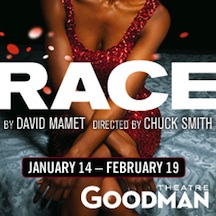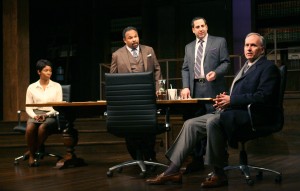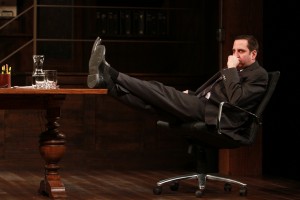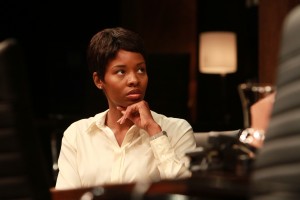MAMET CONFRONTS RACISM
David Mamet’s Race looks at the racial situation in this country and sees an unbridgeable chasm between blacks and whites in our society. It’s a bleak vision, fortunately delivered with scintillating dramatic tension and some very funny dialogue. Indeed, audiences will spend much of the evening laughing at what’s happening onstage at the Goodman. But after they leave the theater, patrons may reflect that what they just saw isn’t so comical.
The action of Race takes place over a two-day period in the law office of an upscale firm in New York City. Attorneys Jack Lawson (white) and Henry Brown (black) are considering whether to accept the case of Charles Strickland, a white multimillionaire accused of raping a black woman. The lawyers go back and forth over whether to take on the high profile and racially sensitive case. The play has numerous plot twists that it would be unfair to divulge. But it gives nothing away to state that Brown and Lawson express their vision of racial relations in America in terms that some people would call deplorably cynical (the lawyers, however, would call their views clear-eyed and realistic).
Race is divided into three scenes, the second and third separated by an unnecessary intermission. The production runs about 90 minutes, plenty of time for Mamet to dramatize his jaundiced view of the American racial divide. Along the way he takes his shots at the American legal system, where “truth” and “justice” and “objectivity” are mere buzz words. It’s all about shaping a jury’s understanding of the evidence. Any audience members scheduled to face a jury trial will come away with a considerable feeling of unease unless they are confident that their attorneys can manipulate the system in their favor. The rights and wrongs of a case – where perceptions are everything – are of no consequence.
For Brown and Lawson, racial attitudes consist of stereotypes, prejudices, and muddled motivations. The blacks wallow in shame, the whites in guilt. Suspicion and paranoia are everywhere. Racial assumptions are based on the fear of being considered insensitive or intolerant, but deep down we know how we really feel about the other race and it isn’t pretty. After generations of racial conflict in America, the society is so tied up in knots over the issue that any kind of resolution appears impossible. There is too great a separation between what we ought to believe and what we really think deep down inside ourselves.
None of this may be new, but it sounds fresh and disturbing in Race. Mamet is at the top of his game in eloquently and incisively staking his claim that our national racial conflict has become too ingrained to claim any solution. His characters speak sentiments that we should dismiss as outrageous in their insensitivity and cynicism, yet they sound so persuasive – and that’s what makes the play unsettling for the audience.
The first two scenes ride on waves of dark humor. The momentum slows down in the final 15 minutes with a plot reversal (easily anticipated by the attentive viewer) that injects an element of melodrama into the story. The ending dispels any audience hope that somehow a shred of racial accommodation can emerge from the characters. The distrust and downright hatred run too deep. It was ever thus and will ever be so.
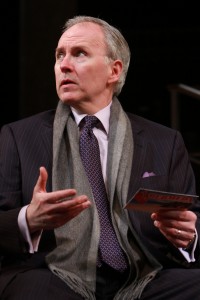 Lawson and Brown carry the narrative, but there are two other characters in the play, Charles Strickland and Susan, a newly hired young lawyer in the firm who is black and female. The millionaire defendant in the case is an opaque figure in Patrick Clear’s performance – I couldn’t get a handle on the character, one who exists ultimately as a plot device. Susan is played as a mostly silent presence by Tamberla Perry for much of the play. In the final scene, Susan moves to center stage, an abrupt switch from her passive existence early on that makes some demands on audience credibility.
Lawson and Brown carry the narrative, but there are two other characters in the play, Charles Strickland and Susan, a newly hired young lawyer in the firm who is black and female. The millionaire defendant in the case is an opaque figure in Patrick Clear’s performance – I couldn’t get a handle on the character, one who exists ultimately as a plot device. Susan is played as a mostly silent presence by Tamberla Perry for much of the play. In the final scene, Susan moves to center stage, an abrupt switch from her passive existence early on that makes some demands on audience credibility.
No criticisms can be leveled at Marc Grapey’s Jack Lawson and Geoffrey Owens’s Henry Brown. They soar with Mamet’s razor sharp, no holds barred language. Grapey has the best lines, meaning the most caustic, R-rated, and abrasive, and he has a ball with them. What Lawson says is continuously offensive, but he goes on with such relish that Grapey’s performance becomes almost endearing. Owens’s Henry Brown matches Lawson in skepticism but has less stage time to blister the audience with Mamet’s knee in the groin dialogue. The worldviews of the two men may be deplorable, but they are an intelligent and articulate pair, not a couple of bigoted rabble-rousers. They see race in American society with unblinkered eyes and they earn our attention. No doubt they would ask for our sympathy as well: after all, in their minds, they are merely telling it like it is.
Credit director Chuck Smith with the brisk pacing – the racial slurs, obscenities, scorn, mockery, and derision cascade over the audience like a verbal tsunami. The energy is consistent throughout, making the plot-heavy final minutes only a minor blemish. The production fits snugly in Linda Buchanan’s authentic-looking law office interior. Birgit Rattenborg Wise designed the costumes, Robert Christen the lighting, and Ray Nardelli and Josh Horvath the sound.
photos by Erik Y. Exit
Race
Goodman Theatre in Chicago
ends on February 19, 2012
for tickets, visit Goodman
for more shows, visit Theatre in Chicago
